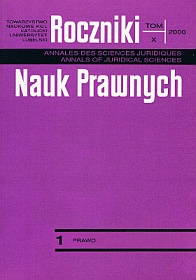Chair of Criminal Law Incitation in Polish Criminal Law
Abstract
The criminal code of 1997, similar as in the criminal code of 1969 and 1932, the institution of incitation was regulated on the basis of the conception of phenomena worked out by J. Makarewicz. The content of incitation is inducement which consists in a conscious and relatively intensive influence on another person’s psyche, designed to make the induced persons in the manner that is imagined by the inducing person. The act to which the inciter induces does to have to fulfill all the premisses which allow us to treat it as a crime. It is
enough for the act to be prohibited according to 115 par. 1 k.k. A particular controversial problem to be settled in literature is the question whether incitation has or does not have any effect. The interpretation of the current regulations make us conclude that incitation is completed when the inciter does the act of "inducement". A condition for incitation is not the fact of any effect, neither in the form of "inducement", nor in any form of the wrongdoer’s commitment of a prohibited act. From the subject’s point of view, the behaviour taken with a direct intention falls under legal qualification from the regulation on incitation. In the light of the criminal code regulation of 1997 it is unacceptable to incite to involuntary crimes. It is possible, however, to take the inciter responsible for a voluntary-involuntary crime.
Copyright (c) 2000 Roczniki Nauk Prawnych

This work is licensed under a Creative Commons Attribution-NonCommercial-NoDerivatives 4.0 International License.


